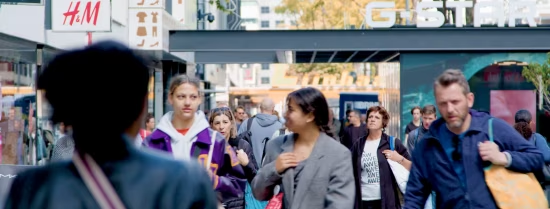Clothing plays a major role when it comes to sustainability. Fast fashion is an increasing problem. The clothing mountains in Africa are getting bigger and bigger. What can we do about this? How can Erasmus University Rotterdam have impact in addressing this important issue? Dr. Mariangela Lavanga (ESHCC/DIT) focuses on the transition to a more sustainable fashion and textile industry in her research and education, especially in the minor Fashion Industry.

Be part of the change
"The world is in crisis. And persistent problems of unsustainability are present in many sectors of our economy and fashion is not an exception. That's why at Erasmus University, we wanted to start doing research and education in the fashion industry and be part of this change."
Dr. Lavanga is always wondering why people need so many things in their lives. "We can enjoy fewer items that are really good made and represent who we are, our identity."
"At Erasmus University, we felt that there was a gap in education and research and that we could fill that by introducing a minor in Fashion Industry that would actually look at the cultural economic aspects of this industry, but also the business history and the media." The minor Fashion Industry was launched in 2016 together with colleagues Prof.dr Ben Wubs (History dept.) and dr. Ana Uribe Sandoval (Media dept.) as a first interdepartmental and interdisciplinary minor, but also the first academic minor in fashion in The Netherlands.

Innovation and a mindset change
Jana van den Bergen, Innovation Associate at Fashion for Good and alumna of the first edition of the minor Fashion Industry explains: "I chose the minor Fashion Industry because my bachelor International Business Administration was very theoretical and numbers focussed and I missed the creativity and practical applications. I knew to some extent about the wicked issues of the fashion industry, both social and environmental, but during this minor, I really dove into this. Looking at this from different perspectives, trying to find holistic solutions to the problems that are opposed to you."
"It's all interconnected, for example if you solve one issue in the factory, making it more efficient, you may have to risk that you lose workers jobs. So it's always about the balance between social and environmental impact."
"It's always about the balance between social and evironmental impact."
"For me, sustainability is really about innovation and a mindset change, so on the one hand we need innovation to make current processes more sustainable, and on the other hand we need to change mindsets to make sure we really adopt these new technologies and processes."
Redefining sustainability
"There is a dangerous thing in fashion: they play with being hot or not. And that part of fashion is for me worthless", Margreeth Olsthoorn, who is a fashion curator, stylist and shop owner, says. "I really think we have to redefine the word sustainability. Sometimes it is used as a marketing tool to sell more clothes." Sometimes customers come in her shop after twenty years and tell her that they still wear those pieces, or for instance their daughter is. "To me, that's real sustainability."
Dr. Lavanga: "The huge problem of fashion is that there has been an increasing distance between where fashion is produced and where fashion is actually consumed. We don't care who made our clothes, we don't care where they were made. So in the minor, we are also looking at that there is still so much human labour in fashion, mostly by women, and that by ignoring them, you ignore a large problem, as many workers are paid very low wages and accidents happen. Like in Bangladesh, the factory that collapsed and many brands were washing their hands, saying they didn't know they were producing there. And that also means that there is a huge problem of transparency in the industry. That's why young designers are experimenting more with local production."

Fashion incubator
There are good examples of new ways of working, towards a more sustainable future. In our own city even. Mevan Kaluarachchi is one of the designers at De Wasserij, an incubator for innovative fashion in Rotterdam. Kaluarachchi: “In my work as a designer, sustainability means a lot to me. For me it’s a philosophy. It’s a way of thinking. Most of the people who work here, are working in the same way. They are all producing in small quantities and they buy their materials from local sources. They bring their materials here, so that’s a very sustainable way of working.”
"We really believe that Erasmus University can be the place where this form of transformative education and research can thrive."
Dr. Lavanga: "I think this is the right time for Erasmus University to experiment with what we call transformative education and research, in close collaboration with stakeholders. We recently launched the Design Impact and Transition platform, that really offers academics a space to bring this form of education around sustainability to the next level. Through the experience of our students, we already saw how they become part of the change. So we really believe that Erasmus University can be the place where this form of transformative education and research can thrive."
Minor
- Associate professor
- More information
The Erasmus School of History, Culture and Communication (ESHCC) hosts the Departments of History, Arts and Culture Studies, and Media & Communication at Erasmus University. ESHCC offers high-quality education and research at the interface between the Humanities and the Social Sciences.
The Design Impact Transition (DIT) Platform at Erasmus University Rotterdam empowers radically new ways to do research, education and engagement for a just and sustainable future.

